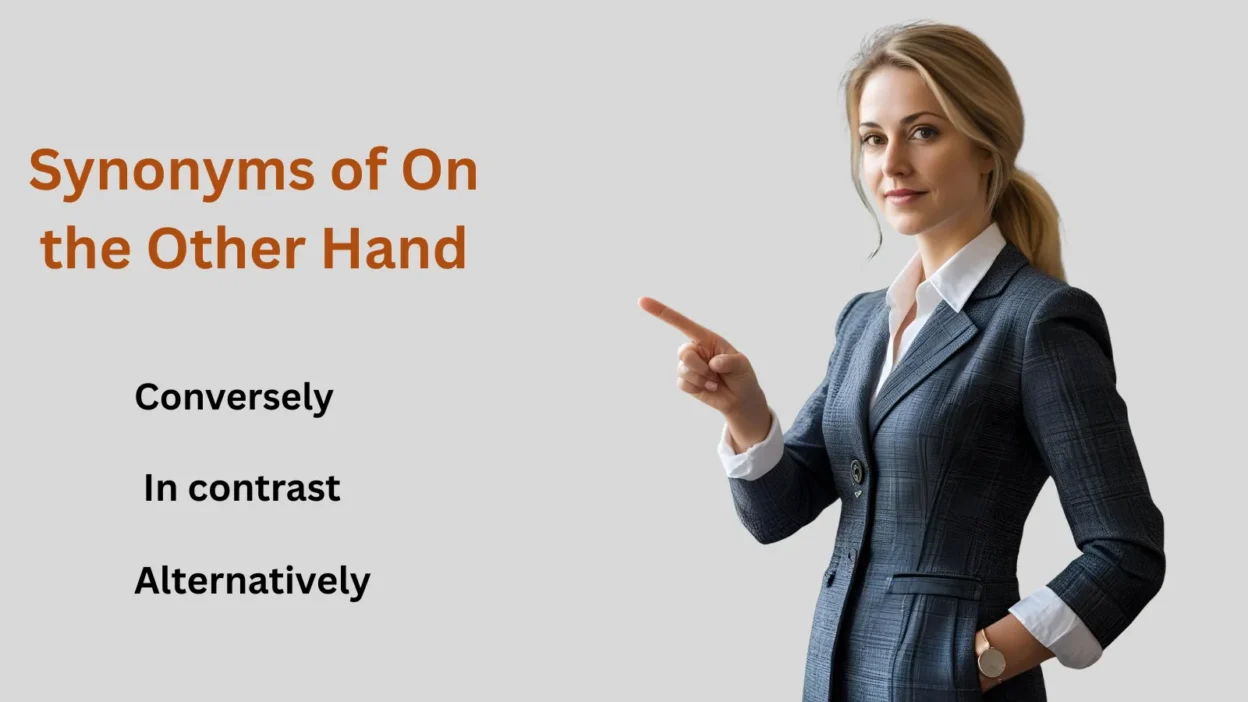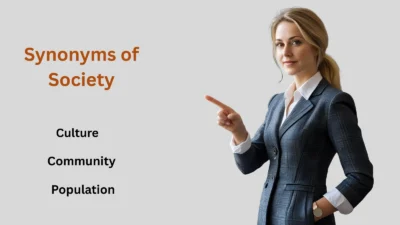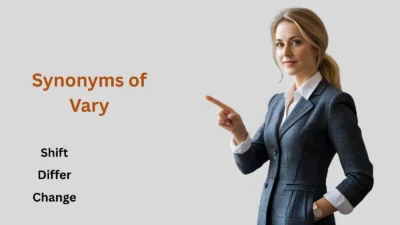When you use the phrase “on the other hand,” you’re showing contrast. It’s a simple way to say there are two sides to an idea. For example, you might say, “I love city life. On the other hand, the noise can be too much.” This phrase helps balance thoughts, but sometimes it feels overused. That’s when people start looking for synonyms of on the other hand to make their writing or speaking sound fresh.
Writers, students, and professionals often want alternatives that show contrast in a smoother or more formal way. Some synonyms highlight balance, others stress opposition, and a few give a lighter or conversational tone.
In this article, we’ll explore 30 synonyms of “on the other hand.” You’ll find clear meanings, example sentences, and tips on when to use each phrase so your words stay clear, engaging, and precise.
What Does On the Other Hand Mean?
The phrase, on the other hand, is used to introduce a contrasting point of view or an alternative consideration. It signals to the reader or listener that you are presenting another angle or weighing pros and cons.
Though neutral in tone, it often carries a modest and measured nuance — it’s a gentle way to say, “Here’s another perspective to consider.”
It’s not aggressive or forceful but rather reserved, inviting thoughtful reflection rather than confrontation.
Synonyms of On the Other Hand and How to Use Them
1. Conversely
- Meaning: Indicates a direct contrast or opposite idea.
- When to use: Formal or academic writing.
- Example: The north side gets a lot of sunlight; conversely, the south side is often shaded.
2. In contrast
- Meaning: Highlights a clear difference.
- When to use: Neutral tone; suitable in essays or discussions.
- Example: She loves spicy food. In contrast, her brother prefers mild dishes.
3. Alternatively
- Meaning: Suggests another option or possibility.
- When to use: When offering a choice or a different approach.
- Example: We could take the highway. Alternatively, we could drive through the countryside.
4. That said
- Meaning: Introduces a qualification or exception.
- When to use: Informal or conversational writing.
- Example: The job is demanding. That said, it offers a great experience.
5. On the flip side
- Meaning: Informal, showing the other side of a situation.
- When to use: Casual or conversational contexts.
- Example: The apartment is small. On the flip side, it’s very affordable.
6. By contrast
- Meaning: Shows a clear difference.
- When to use: Formal or analytical writing.
- Example: The East Coast is humid. By contrast, the West Coast is dry.
7. Whereas
- Meaning: Highlights opposition between two things.
- When to use: Formal or written language.
- Example: He prefers coffee, whereas she likes tea.
8. Yet
- Meaning: Presents a surprising or contrasting fact.
- When to use: Both formal and informal; often at sentence start.
- Example: The plan seemed perfect, yet it failed in execution.
9. On the contrary
- Meaning: Disagrees or contradicts a previous statement.
- When to use: Formal or argumentative writing.
- Example: I’m not tired. On the contrary, I feel energized.
10. Instead
- Meaning: Proposes a choice or action.
- When to use: Clear, simple alternatives.
- Example: Don’t take the bus. Instead, walk to save money.
11. Meanwhile
- Meaning: Indicates something happening at the same time but differently.
- When to use: Describing parallel, contrasting actions.
- Example: She studied law. Meanwhile, her brother pursued music.
12. All the same
- Meaning: Concedes a point but introduces contrast.
- When to use: Informal to moderate formality.
- Example: It was raining heavily. All the same, we went hiking.
13. Nonetheless
- Meaning: Despite what was just said, it introduces a contrast.
- When to use: Formal or written language.
- Example: The project was risky. Nonetheless, it succeeded.
14. Nevertheless
- Meaning: Used to show contrast or introduce a different perspective.
- When to use: Formal writing.
- Example: He was inexperienced. Nevertheless, he performed well.
15. Di sisi lain
An idonishian word for on the other hand
- Meaning: Adds a contrasting idea.
- When to use: Both in casual speech and formal writing.
- Example: Dia suka tinggal di kota; di sisi lain, desa lebih tenang.
- (Translation: He likes living in the city; on the other hand, the village is calmer.)
16. Even so
- Meaning: Acknowledges a point but introduces a contrast.
- When to use: Neutral, both spoken and written.
- Example: She’s new to the job. Even so, she’s doing great.
17. Por otro lado
A spainsh word for on the other hand
- Meaning: Used to introduce a contrasting or additional point.
- When to use: Everyday speech, casual or formal writing.
- Example: Me gusta vivir en la ciudad; por otro lado, el campo es más tranquilo. (Translation: I like living in the city; on the other hand, the countryside is calmer.)
18. Inversely
- Meaning: Indicates an opposite relationship.
- When to use: Technical or scientific contexts.
- Example: The demand drops, inversely, the price rises.
19. Otherwise
- Meaning: Indicates an alternative possibility or consequence.
- When to use: Conditional or warning contexts.
- Example: Wear a jacket, otherwise you’ll get cold.
20. In any case
- Meaning: Changes direction in argument or conversation.
- When to use: Informal to moderate tone.
- Example: It might rain. In any case, we’ll go out.
21. On one hand
- Meaning: Introduces one side of an argument; often paired with on the other hand.
- When to use: Balanced arguments.
- Example: On one hand, it’s convenient. On the other hand, it’s costly.
22. Still
- Meaning: Concedes a point but adds contrast.
- When to use: Informal, conversational.
- Example: It was late. Still, he decided to call her.
23. Though
- Meaning: Adds contrast; often at the end of a sentence.
- When to use: Informal.
- Example: The movie was long. Fun, though.
24. On the other side
- Meaning: Similar to on the other hand; less common.
- When to use: Describing opposite perspectives.
- Example: The town is quiet. On the other side, the city never sleeps.
25. Rather
- Meaning: Introduces a mild contrast or correction.
- When to use: Formal or polite corrections.
- Example: It’s not cold, but rather chilly.
26. Alternatively speaking
- Meaning: Formal variant of alternatively.
- When to use: Polished or academic.
- Example: We can take route A. Alternatively speaking, route B is safer.
27. In another light
- Meaning: Offers a different perspective.
- When to use: Reflective or analytical writing.
- Example: The decision seems harsh; in another light, it’s fair.
28. As opposed to
- Meaning: Highlights contrast by opposition.
- When to use: Formal or clear comparisons.
- Example: He prefers tea, as opposed to coffee.
29. Differently
- Meaning: Presents an alternate manner or perspective.
- When to use: Simple contrast in action.
- Example: She approached the problem differently than I expected.
30. En cambio
A Spanish Word to On the Other Hand
- Meaning: Shows contrast by highlighting a difference.
- When to use: Common in spoken Spanish and writing to compare ideas.
- Ejemplo: Ella prefiere el café; en cambio, yo siempre tomo té.
- (Translation: She prefers coffee; on the other hand, I always drink tea.)
How to Choose the Right Synonym
- Formality: For academic or formal writing, prefer conversely, in contrast, nevertheless, or on the contrary.
- Tone: For a friendly, conversational tone, use that said, on the flip side, or still.
- Context: When offering alternatives or choices, alternatively and instead are your best bets.
- Strength of contrast: On the contrary, and yet convey stronger opposition, while though and all the same are gentler.
- Cultural nuance: Some phrases, like on the flip side are more common in American English informal speech, while conversely fit British or academic contexts better.
Conclusion
The phrase “on the other hand” is one of the most common ways to show contrast. It signals that there are two sides to an idea and helps balance your thoughts. But if you use it too often, it can start to sound dull or repetitive. That’s why knowing the many synonyms of on the other hand is so useful.
Words and phrases like however, in contrast, still, yet, and alternatively each bring their own flavor. Some sound formal, others casual, and a few add a smooth, creative touch.
Now that you’ve seen 30 alternatives, you can choose the ones that match your tone, context, and purpose.
With these options, your language will feel fresh, clear, and powerful—no matter the situation.



